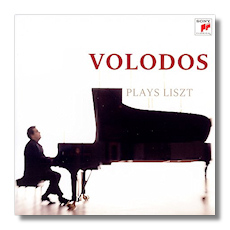
The Internet's Premier Classical Music Source
Related Links
- Liszt Reviews
- Latest Reviews
- More Reviews
-
By Composer
-
Collections
DVD & Blu-ray
Books
Concert Reviews
Articles/Interviews
Software
Audio
Search Amazon
Recommended Links
Site News
 SACD Review
SACD Review
Franz Liszt

- Vallée d'Obermann (Années de pélerinage, Première année - Suisse)
- Il Penseroso (Années de pélerinage, Deuzième année - Italie)
- St. François d'Assise - La prédication aux oiseaux (Légende #1)
- Bagatelle ohne Tonart
- Hungarian Rhapsody #13 (arr. Volodos)
- Sposalizio (Années de pélerinage, Deuzième année - Italie)
- Weinen, Klagen, Sorgen, Zagen (Prelude after Bach)
- Funérailles (Harmonies poétiques et religieuses)
- La lugubre gondola #2
- En rêve - Nocturne
Arcadi Volodos, piano
Sony Classical SK87380 Hybrid Multichannel SACD 76:16
Some years ago, after Vladimir Horowitz died, there was talk that he was "the last Romantic." Other recent candidates included Jorge Bolet and Shura Cherkassky, both now deceased. Our most recent "last Romantic" (!) probably is Earl Wild, who now is in his nineties. Is he really the last one, though, or when he passes away (not soon, one hopes), will others be given the mantle? Not Lang Lang or Yundi Li, I think, although they have their admirers. No, I think the most likely candidates are two Russians, both of them now in their thirties. I am referring to Evgeny Kissin and Arcadi Volodos. Both are pianists with incredible techniques, and the intelligence to know where their particular strengths lie. What makes them Romantics is their choice of repertoire, and their old-school style of playing, which is a combination of muscle, wit, and heart (preferably on the sleeve).
Volodos was born in 1972, and was something of a late starter, because he didn't begin piano lessons until he was eight. Furthermore, he did not commit himself seriously to the instrument until he was 14 or 15. In the past two decades he has made a lot of progress, though! One would be hard-pressed to find a living pianist whose technical armamentarium exceeds his. Indeed, this causes him sometimes to be compared to Horowitz, although the comparison also refers to his mastery over tone color. Through pedaling, fingering, and touch, Volodos can draw what seems like an infinite variety of shadings from a single note.
This is his sixth disc for Sony Classical. The repertoire has been on the safe side (Tchaikovsky's First Piano Concerto, Rachmaninoff's Third, etc.), and perhaps that has hurt him a little, because how many people want a new recording of these warhorses? This Liszt offering is a better bet, not just because the music is (somewhat) less familiar, but also because the program has been put together and arranged by a poetic soul, be it Volodos or someone else. I appreciated the way in which the heroism and idealism of the first half (climaxed by the pianist's finger-breaking arrangement of the Hungarian Rhapsody #13) is followed by a sort of dying fall. This culminates in two of Liszt's late masterpieces – La lugubre gondole #2 and En rêve – dark, expressionistic music in which Liszt anticipates the 20th century. (Volodos also reminds us how much the ending of Sposalizio sounds like Debussy!)
This is a studio recording from 2006, and it captures the sound of a grand piano better than most. Furthermore, Volodos, rather than losing his spontaneity in the absence of an audience, gives a remarkably "live" performance on this SACD. His virtuosity is on display where it is required, but his musicianship is on display throughout. Indeed, the late piano pieces are relatively easy to play, at least in terms of finger-placement, but they are hard to interpret, and Volodos excels here as well. This is one of the best new Liszt recitals I have heard in a long time.
Copyright © 2007, Raymond Tuttle




















